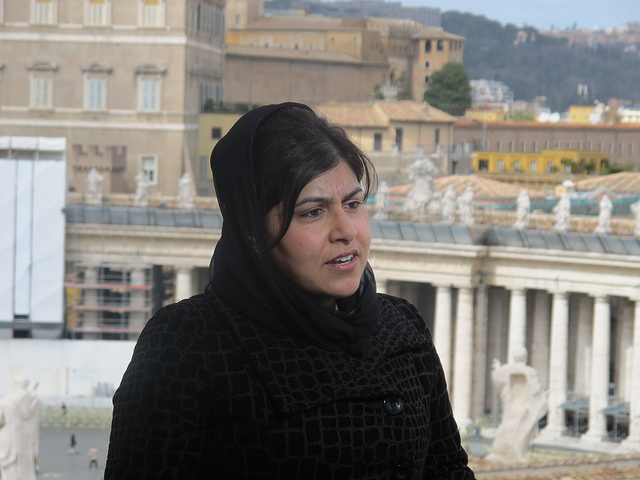Operation Protective Edge has claimed its first political casualty. The victim is neither Palestinian, nor Israeli. In a delightfully ironic turn of events, it’s the chief executive of Mandate Palestine’s former colonial parent state, the United Kingdom. Fittingly, David Cameron received the resignation letter of his best-known Muslim minister, Baroness Sayeeda Warsi, who quit over his support for Israel’s campaign in Gaza.
It’s an interesting turn of events for Warsi, who was made Vice-Chair of the Conservative Party mainly because David Cameron needed a token minority, to broaden his appeal to Britain’s growing Muslim middle class.
Unsurprisingly, Warsi ended up showcasing the Conservatives’ shortcomings in capturing the imagination of a an increasingly diverse electorate, and probably for her own selfish reasons as well.
As unprecedented and positive as it is for a government official to resign over the Gaza crisis, those familiar with Warsi are skeptical about her motives. Oliver Wright says in The Independent that her concern for Gazans seems genuine, especially when it comes to the civilian death toll. That much is probably true, and Warsi isn’t the first Pakistani Westerner to have a moral objection to the conflict. She also isn’t the first member of the coalition to clash with Cameron on this topic, either.
Although it is officially unwavering in its support for Israel, Deputy Prime Minister Nick Clegg appeared to agree with Warsi on some level when he floated a suspension in arms exports to Israel. Former Tory Defence Ministers Nicholas Soames and Peter Luff have also hesitated at backing recent Israeli policy, and they are joined by prominent backbencher Margot James. There are obvious cracks in what is often alleged to be a consensus, and Warsi has given voice to them.
At the same time, it is hard to believe that Warsi didn’t also think about how this move spared her the humiliation of being asked to leave the government, as it prepares to move further rightwards, in preparation for the next national election. At a time when UKIP has defined the ethnic imaginary of Britain’s mainstream parties, having a high profile South Asian on Cameron’s team is bad for publicity. Warsi has also been falling out of Cameron’s favour for a while now, which is why she was demoted to Minister of Faith and Communities two years ago. It is highly likely that she resolved to make a splash about something she cared about, in order to control the narrative surrounding her inevitable departure.

Now, many media outlets aren’t discussing her incompetence so much as they are quoting her as saying that she wanted a war crimes trial at the International Criminal Court. There is no talk about the homophobic leaflets used in her 2005 Dewsbury run; instead, if her career ends with this, it will be with talk of her support for the UN Palestinian Statehood vote in November 2012, and her calls for an arms embargo against Israel. She is now branded as a principled woman, which despite being clearly inaccurate, will allow her to save face, especially in her own community of British Pakistanis.
Still, this doesn’t change the fact that Warsi articulated a frustration that many people have had with the British government, particularly the country’s Muslim community. While there is a tremendous amount of diversity in British public opinion when it comes to Israel-Palestine, almost none of it ends up reaching the state level. Warsi’s resignation letter went on to frame this disconnect as an electoral problem, not just a cultural one.
It isn’t just Gaza. That is just a high-profile example. The Conservative Party hasn’t been able to deliver a compelling platform to British minorities (the “ethnic vote,”) which is going to impact its long-term election prospects. This is what is implied when Warsi wrote in her resignation letter that the Tories need to “evolve to meet the challenges we face in Britain today and ensure that the Party is relevant and responsive to all communities that make up today’s Britain.”
Warsi isn’t wrong. While the Conservative Party got 36% of the overall vote in 2010, it only got 16% of the minority tally. The main problem is that right now, the Labour Party is the obvious vote for British minorities, and this is especially true if they’re Muslims. Could there be any clearer example than the Jewish Ed Miliband ending up being the one who said that Warsi “acted with principle and integrity”? It doesn’t matter that Labour holds continuity with many Conservative policies, and often responds to xenophobia with hesitation. The party still absorbs minority voters, and this is going to remain true as long as Labour maintains the pretense of being a big tent, sheltering a variety of center-left voting communities.
Still, this situation isn’t going to last forever. Populists may dream otherwise, but British minorities aren’t going anywhere. Sooner or later, both the Tories and Labour are going to realize that they have to practice a new form of politics that sincerely reflects the demands of the country’s multiethnic polity. British conservatism may very well end up being less white. The challenges of confronting that kind of politics is another question. Nonetheless, it remains noteworthy that such domestic conflicts over diversity had to reach their crisis point in a former British territory best known for its problems with racism. Leave it to an ailing minority politician to make that connection.
Photographs courtesy of UK in Holy See and The Weekly Bull. Published under a Creative Commons License.






1 comment